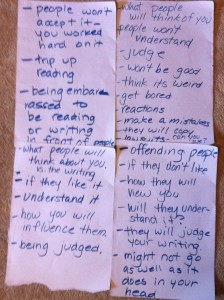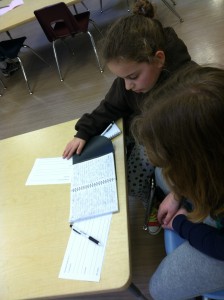Encourage At Risk Behavior
September 23, 2013 | Posted in Blog: Story Stories, Book Reviews | By Kristin
Comments Off on Encourage At Risk Behavior
Recently I ate dinner with e.E. Charlton-Trujillo, who is brave. I say that not simply because she wrote Fat Angie, but because she came to San Francisco to meet a bunch of writers she didn’t know for dinner. Over the Bay Bridge. At six p.m.
Clearly, she’s not from The Bay Area.
But yet, Eunice set up a dinner – over the internet – with strangers, and drove up from LA – from the morning commute – to meet us. We brought the food. She ate it.
Not only is she brave. She’s trusting.
This dinner was one stop on Eunice’s “At Risk” summer. Rather than do a typical sign-the-title-page book tour, she is touring the country, actually meeting and interacting with her readers. She is taking some serious risks.
Although, I don’t think that’s what she had in mind by the term “at – risk.” I believe she meant working with kids who are “at – risk.” But her summer has put her in some high risk situations: driving rental cars in Bay Area traffic, meeting strangers in private homes, eating surprise food, and above-all-else, telling the truth about herself, to anyone who will listen. She puts herself at risk everyday.
To me, that’s the beauty in Eunice and her work. Her bravery encourages us.
That evening, Eunice did two things to make me braver. First of all: she spoke up. She simply sat at the table with us and told us about herself. Even though we’d never met. That was risky. Maybe we would have a different opinion or attitude. But she made herself vulnerable immediately, easily and with a laugh. Several laughs, actually.
Her honesty enabled me to speak up.
The second thing she did to make me brave was she listened. She paid attention to each and every person at the table. Listening is risky because you might not like what you hear. Or you might change. Or you might feel you have to respond. Eunice did respond. She asked questions after every story.
Eunice’s book, Fat Angie, may be a powerful force, but I believe its because Eunice is so gentle. She knows people so well because she can interact with us honestly. She can risk a conversation, risk her time, risk a change, risk a bad dinner, a different opinion, or a wrong turn. And laugh.
I hope you read Fat Angie. It’s about a girl who takes risks. She’s hurt, bullied and ostracized. But, ultimately, Angie’s efforts pay off. Angie is brave because she puts herself at-risk again, even though she’s been hurt in the past.
The book is a quick read because the characters enter your heart quickly, as if they simply sat down at your table and started asking you questions.
If you are a high school teacher, I’ve got a story sheet for your students on narrative structure (part of the common core). It’s free to download. Help yourself.
Cookies Conquer Fear
June 20, 2013 | Posted in Blog: Story Stories, teaching | By Kristin
Comments Off on Cookies Conquer Fear
As a Young Inklings and Hillview Author Author teacher, I have hosted thirty-one class parties over the last three years. I’ve heard nearly three hundred kids – Kindergarten through age fourteen – read their original stories out loud to an audience.
Each student created something unique, from her own imagination. This story – brand new to the world but very close to her heart – she shared with others, some of whom she did not know.
This takes incredible courage. For boys and girls alike.
I usually ask the teenagers to list their fears the week before the reading. This takes a lot of paper. Fears about reading original work aloud include: “people won’t understand you, tripping up reading, being judged, being misunderstood, tripping up and other variations on what others may think.”
We discuss each of the fears. Unfortunately, these are rational fears. I never promise kids that these things will not happen. They might.
We can’t control what others think. We make mistakes.
I don’t tell students this, but I’ve seen worse things happen: accidents, tears or uncontrolled giggles. It’s scary to face your greatest fears while everyone is watching you.
So, why do it?
Well, the kids in my elementary classes will tell you its because they get a cookie afterward. At each party every kid gets a cookie. They know this from day one. Each student reads the story she has written aloud to an audience of other students and, if elementary kids, also parents – usually about 15 – 30 people. We talk a lot about this cookie for the nine weeks leading up to the party.
When we have writer’s block because we can’t come up with the exactly perfect thing to write, we talk about the cookie, and how many weeks it is until cookies. This might be a good time to go ahead write anything: it doesn’t have to be perfect. It just has to be ready for when we have cookies together.
When we start to get scared about reading the story we have written out loud, we talk about how there will be cookies afterwards. No one will be thinking about us and whether our pants are zipped up, they will be thinking about when we have cookies together.
To be clear: these cookies are from Safeway.
Even though it’s all about the cookies, it’s not about the cookies at all.
It’s about the other part of the sentence: We will all have the cookies together.
It’s about faith. We need to know that all our effort, all our work will be valued by those around us. We need to know we matter. We need to be acknowledged. We will not be alone in the moment of our greatest vulnerability.
Promising friends and families cookies for that support seems like the least we can do. And, certainly, when kids are this courageous, they must know they we will be there for them at the end. When they face their fears – and they are substantial: rejection, judgment, and failure – we will be there.
And, we want to know everything will be OK on the other side.
The cookie is just our excuse.
And that’s just fine with me. These kids are brave enough as it is.
We Are Not Alone
June 10, 2013 | Posted in Blog: Story Stories, teaching | By Kristin
Kids who write need friends who write. Every writer needs friends. We need to be heard. Writing friends are special because they listen to our stories.
Friends believe us. They know the names of our characters, the places we’ve created and the challenges we face. They ask us questions. They cheer for us and laugh alongside us. They remind us about what we have forgotten.
I love to see kids sit next to each other in writing class. They don’t always read each other’s journals, but they frequently discuss their stories together.
Often, there is laughter.
It is lonely to make a new world. When we invite a friend – a real person – into this new place, we know we are not alone. Our friend has entered with us. She will help us get this place ready for other visitors: which is our greatest dream and biggest fear.
In writing class, many kids are ready to share their work immediately – sometimes we read to everyone at the end of the day – and some kids may take almost a year until they find someone they trust, or are ready to read to the group.
When a writer is afraid, often her friend will read her work aloud for her. This way she knows her work matters to us.
Sometimes our writing friends are the only ones who demonstrate that our work matters. Writing friends have many important jobs.
Writing friendships are delicate because writers tend to be sensitive. Something intended as an observation may be felt as a criticism. When spoken by one we trust, however, just such an observation can lead to growth. For example, a fourth grade student recently commented to another: “Your main characters are always girls.”
Instead of feeling hurt, this writer took the challenge. She wrote her next story outside of her comfort zone, with a fascinating new premise. The class begged to hear sections of her new story read aloud each week. When friends believe in us enough to listen carefully and tell the truth, everyone benefits.
We don’t need 500 friends. Anyone – kids or adults – would be lucky to have one or two true friends.

